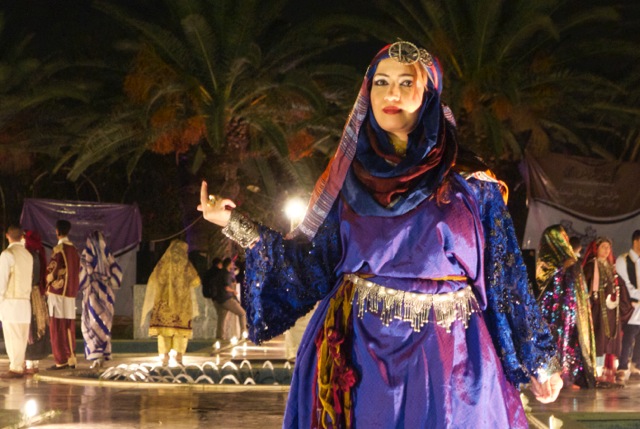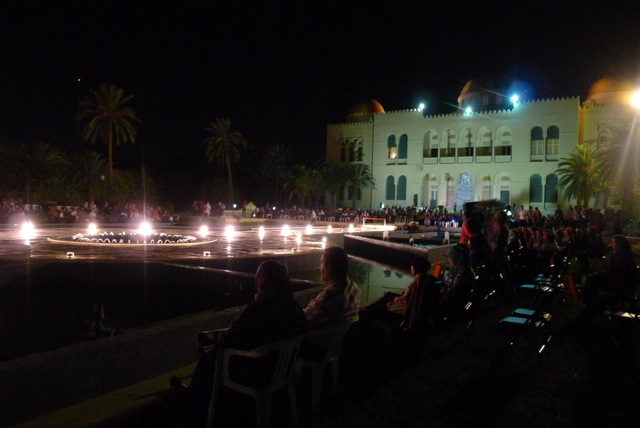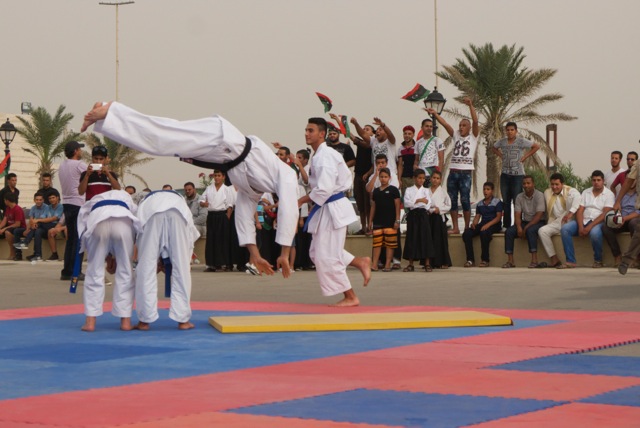By Libya Herald staff.

Tripoli, 14 October 2015:
A four-day culture festival in Tripoli avoided politics in favour of celebrating Libya’s rich cultural . . .[restrict]heritage and difference, from traditional music and fashions to modern rap and motor-sports.
Behind Tripoli’s illuminated King’s Palace, the newly-fixed fountains flowed either side of the spot-lit central avenue, which was transformed on Saturday night into a catwalk for a display of Libyan wedding fashions through the ages. An enraptured audience cheered on the shy models making their fashion debuts to a soundtrack of traditional music and spirits ran high.

Sunday evening was dedicated to a range of Libyan music and poetry with performers including Mohamed Motatik – an up-and-coming young singer from the southern town of Ghat. For him, the event also served as a warm-up for a forthcoming trip to Algeria, where he will be auditioning for a place on Arab Idol. Singer-songwriter Mabrouk Gnejewa then had the audience in fits of laughter with three light-hearted numbers about everyday Libyan life, which were followed by a mesmerising set of traditional Libyan malouf music.
As well as these family-friendly performances, the grounds of the King’s Palace were given over to stalls and tents, with had a focus on traditional Libyan culture, history and identity. Tawerghan and Misratan tents were just metres apart, showing one way in which the festival put politics to one side. “Some young people from Misrata helped us set up our tent and we hung out with them and drank tea together,” said Amal, one of some 30,000 Tawerghan IDPs who have lived in camps across Libya since being displaced in 2011. “This is one of the main purposes of this event, to just be Libyans together,” she explained.

“We just need safety, security and peace now,” said Ahmed Sassi, at a nearby stall representing Amazigh culture from the mountain town of Yefren. A popular tourist destination before security in western Libya deteriorated, the stall was advertising an ancient Yefren home now transformed into a hotel, where guests can choose from a luxurious subterranean dwelling or one of the exquisitely-decorated rooms above ground. Standing in front of a display of hand-woven bags and rugs, Sassi said he hoped he event would inspire a renewed interest in Yefren for national tourists, adding: “All Libyans know the Amazigh but they don’t know the specifics about our daily life and customs and there has been a lot of interest in this.”
Festival activities sprung up in several other parts of the city. An event on Friday, held in the car-park outside the Ministry of Tourism, gave Tripoli’s young people the chance to showcase their talents, from rap music performances and breakdancing to motorbike stunts. Tripoli martial art clubs demonstrated their skills, with the aikido club showing how a few well-placed expert moves could disarm a gun-wielding attacker, while the karate club demonstration carried a strong anti-bullying message.

“We don’t have any political side, this event is just for the people,” one of the organisers Mustafa Othman Shagalab explained. “We are trying to show positive things about Libya and take people’s minds away from wars and look instead towards good things.” Giving Libyans the chance air their talents in public was an important part of this, said Ihab Dallul, organising outdoor music performances under the banner Sounds of the Street. “We want people to know that we have a lot of talent in Libya and we are planning to do more of these type of events.”
Each day of the four-day festival attracted crowds who tirelessly enthused about the country’s rich cultural diversity, but organisers said they hoped that news of the event would reach behind Libya. “We are hoping to send a message to the world that Libya is more than just the chaos that is reported in the news,” said Emad Elmiraoui, who heads the IT department of the General Authority of Cinema, Theatre and the Arts. It jointly organised the the event with local volunteering organisations and a desert tourism company.
“Inside Libya, we are trying to make people forget about political dramas and inspire the young people to help keep our traditions and culture alive for future generations,” he said. The high turn-out for all four days of the event had delighted the organisers, he said, and the 200-odd volunteers who had turned out to clean up the palace and gardens in preparation for the festival showed what could be achieved with a little encouragement. [/restrict]







